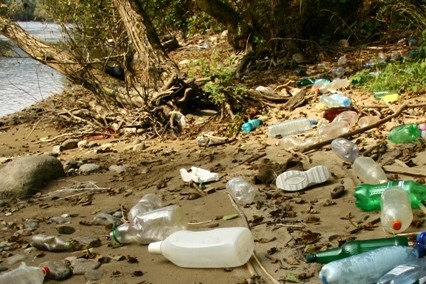A major issue to our oceans are water bottles and their caps. One clean up in the Whitsundays in 2010 pulled 1,564 water bottle caps off one beach near Hamilton Island.
For some reason we are all willing to buy water bottled from Italy or Fiji. For starters this is crazy as it is more expensive than petrol, contains less nutrients and is in a bottle that can be harmful for us. The water here in Australia is of a great quality and yet last year Australian’s consumed 582.9 million liters of bottled water.
 To create the bottles, transport them, refrigerate the water and recycle the bottle is believed to produce in excess of 60,000 tonnes of greenhouse gasses. This is the equivalent of 13,000 cars on the road for a year. But a worse fact is the amount of oil used. We may as well fill your bottle 1/3rd full of oil, that’s how bad our usage is.
To create the bottles, transport them, refrigerate the water and recycle the bottle is believed to produce in excess of 60,000 tonnes of greenhouse gasses. This is the equivalent of 13,000 cars on the road for a year. But a worse fact is the amount of oil used. We may as well fill your bottle 1/3rd full of oil, that’s how bad our usage is.
On a health side, plastic bottles leach harmful PCB’s and BPA’s into the contents. PCBs (Polychlorinated Bipheynls) are a serious health problem because of their persistence in the environment, their accumulation in human and animal tissues, and their potential for chronic or delayed toxicity. The importation of PCBs for most purposes was banned in Australia in the 1970s. However water bottles are still allowed to have them.
BPA’s (Bisphenol A) are chemicals used most commonly to manufacture hard plastics. BPAs are thought to cause problems when bottles are heated and with long-term use. So when you leave your water bottle in the sun, the BPA’s start to leach into your water. It gives it a fowl taste but it s really harmful to you, especially in developing bodies. The toxins reduce growth in vital tissues and organs. This is the reason bottled water has a used by date, it is not the product itself that will go off but the water bottle affecting it.
It is a serious enough issue that some cities are banning bottled water. Here in Australia several small towns have already made the change and it is a growing consensus that these bottled waters are causing health issues.
So how do you make a difference. Not buying bottled water is a start but what are the alternatives. The most simple way is to buy a reuseable bottle or buy water in glass. On the boat we will be using EcoTanka water bottles. The crew love their bottles provided by Naturally Sustainable. They are rugged and the sports cap is great to drink out of on the run. Naturally Sustainable also have the Earthlust range of stylish water bottles and you can see all of these on our eco-store. Made of food grade stainless steel, they don’t leach anything into the water and you can even fit ice cubes in the top. They will last for years and hence take out any number of plastic bottles.
If you still want filtered water, buy a filter for your tap. Inline filters are a far better option than buying bottled water and far more economical. In the office, get filters fitted to taps or fill your bottle from the drink station. Another alternative is the new AquaGen watermaker. This unit produces water out of the air, using the humidity. It can produce up to 30 liters of pure fresh drinking water every day. You can find out more on this product at the eco-store too.
So at the end of the day, I just don’t understand bottled water. What is our obsession with it. It is not good for us, it is not good for the environment and with only 36% of bottles recycled, it is just a waste of resources…..especially when the water in our tap is so good.
So why do you drink bottled water? Is it the convenience and if so, is it worth risking your health and your world?
Ian Thomson
Founder/Director
